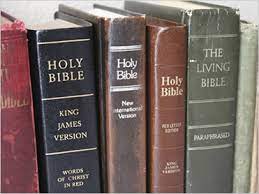Translating the Bible: Does God Inhabit Eternity?

In a recent debate between Will Duffy of OpenTheism.org and Chris Date of Rethinking Hell titled “Does Open Theism Best Explain the Biblical Data?” the debaters discussed the timelessness of God in Isaiah 57:15. One listener named Christopher Fisher asked Chris Date the following question (the question comes at 1:12:15 of the debate): “How can he claim timelessness for God ‘inhabiting eternity’ when the same phrase is used of man in Psalm 37:29?”
In his response to Christopher Fisher, Chris Date said that the use of the Hebrew words in Isaiah 57:15 and Psalm 37:29 was different. Later, Chris Date explained his answer on his Facebook page. He wrote,
In my debate yesterday, during audience Q&A, open theist Chris Fisher challenged my appeal to Isaiah 57:15, in which God is said to “inhabit eternity,” by asking if I “even knew” that the same phrase is used in Psalm 37:29 of human beings. . . .
I was indeed right: the same phrase isn’t used of human beings. The Hebrew in Isaiah 57:15 is שֹׁכֵן עַד, the verb “dwell, inhabit” שֹׁכֵן and the direct object “perpetuity, forever, eternity” (עַד).
The Hebrew in Psalm 37:29 is יִשְׁכְּנוּ לָעַד עָלֶיהָ, the verb “dwell, inhabit” (יִשְׁכְּנוּ) and the prepositional phrase “to/for perpetuity/forever/eternity” (לָעַד) and the prepositional phrase “upon it” (עָלֶיהָ), “it” referring back to אָרֶץ (“land”). Putting the pieces together, it reads, “dwell upon it unto eternity” (or, more simply, “dwell upon it [the land] forever,” per the ESV).
So, no, it’s not the same phrase. Whereas God is said to inhabit eternity itself, it is said of righteous humans that they will dwell upon the earth “unto” eternity.
Throughout the debate Chris Date used the ESV to defend his view about the timelessness of God. The purpose of this essay is not to take a side on the debate between Will Duff and Christ Date, but to study the ESV’s claim that God “inhabits eternity” (Isaiah 57:15 ESV).
The focus of this study is on the translation of the biblical text and not on the theological issue being discussed by the debaters. Thus, I will use the ESV throughout this study unless indicated otherwise. The two texts read as follows:
Isaiah 57:15: כִּי כֹה אָמַר רָם וְנִשָּׂא שֹׁכֵן עַד
“For thus says the One who is high and lifted up, who inhabits eternity” (Isaiah 57:15 ESV)
Psalm 37:29: צַדִּיקִים יִירְשׁוּ־אָרֶץ וְיִשְׁכְּנוּ לָעַד עָלֶיהָ
“The righteous shall inherit the land and dwell upon it forever” (Psalm 37:29 ESV)
Based upon the reading of the ESV, Chris Date concluded, “Whereas God is said to inhabit eternity itself [Isaiah 57:15 ESV], it is said of righteous humans that they will dwell upon the earth unto eternity [Psalm 37:29 ESV].”
The whole issue of this debate is the meaning of the Hebrew word עַד (ʽad) when it is used in the expression שֹׁכֵן עַד (šōkēn ʽad). The word עַד (ʽad) appears 48 times in the Hebrew Bible. In his study of the word עַד (ʽad), E. Jenni said that the word carries the meaning of “always” and “forever.”
In reference to the use of the word עַד (ʽad) in the context of eternity, Jenni wrote, “Special attention should be given to that fact that there is no evidence of a well-conceived theological concept of time and eternity” (Jenni 2004:1060).
Carl Schultz comes to the same conclusion. In his study of the word עַד (ʽad), he writes, “It should be noted that there is no general word for time in Hebrew, neither are there special terms for the past, present, future, and eternity” (Schultz 1980: 2:645). Schultz said that the Hebrew word עַד (ʽad) “always denotes the unforeseeable future.” The basic meaning of the word is “forever.”
English translations differ on their understanding of the word עַד (ʽad). Translations that translate שֹׁכֵן עַד (šōkēn ʽad) as “inhabits eternity”:
NRSV: “For thus says the high and lofty one who inhabits eternity” (Isaiah 57:15 NRSV).
RSV: “For thus says the high and lofty One who inhabits eternity” (Isaiah 57:15 RSV).
KJV: “For thus saith the high and lofty One that inhabiteth eternity” (Isaiah 57:15 ASV).
ESV: “For thus says the One who is high and lifted up, who inhabits eternity” (Isaiah 57:15 ESV).
Translations that translate שֹׁכֵן עַד (šōkēn ʽad) as “lives forever”:
NIV: “For this is what the high and lofty One says– he who lives forever” (Isaiah 57:15 NIV).
CSB: “For the High and Exalted One who lives forever” (Isaiah 57:15 CSB).
CJB: “For thus says the High, Exalted One who lives forever” (Isaiah 57:15 CJB).
LXX “Thus saith the Most High, who dwells on high forever” (Isaiah 57:15 LXX).
In Exodus 15:18, the expression עֹלָם וָעֶד (ʽōlām wāʽed) means “forever and ever”: “The LORD will reign forever and ever” (Exodus 15:18 NRSV).
The English translations that translate שֹׁכֵן עַד (šōkēn ʽad) as “inhabits eternity” have one thing in common: they all follow the KJV. The RSV is a revision of the KJV. The NRSV is a revision of the RSV. The ESV is based on the RSV. Most modern translations translate שֹׁכֵן עַד (šōkēn ʽad) as “lives forever.”
Since there is no concept of eternity in the Hebrew Bible, the idea of eternity is expressed by the use of the Hebrew word עֹלָם (ʽōlām). The word עֹלָם (ʽōlām) is used more than three hundred times to indicate “indefinite continuance into the very distant future.” The word עֹלָם (ʽōlām) is generally used with prepositions indicating direction, מִן (min “from”) and עַד (‘ad “to,” “as far as,” “until”).
In Nehemiah 9:5 the expression מִן־הָעוֹלָם עַד־הָעוֹלָם (min-haʽōlām ʽad-haʽōlām) [from ʽōlām toʽōlām] means “from eternity to eternity” (Nehemiah 9:5 TNK).
In Psalm 106:31 the expression עַד־עוֹלָם (until ʽōlām) means “to eternity” (Psalm 106:31 TNK).
After understanding how the Hebrew Bible expresses the idea of eternity, what does it mean to say that God inhabits eternity? The ESV translates the word שֹׁכֵן (šōkēn) as “inhabits”. The basic meaning of the word is “to dwell,” “to live,” “to settle.” The basic idea is to live in one place. To say that God “inhabits eternity” is almost saying that God lives in a place called “eternity”. The ESV correctly translates the word שֹׁכֵן (šōkēn) as “live” in Psalm 39:7.
The word שֹׁכֵן (šōkēn) appears 22 times in the Hebrew Bible. Generally, the ESV translates the word שֹׁכֵן (šōkēn) as “dwells”: “I the LORD dwell in the midst of the people of Israel” (Numbers 35:34 ESV). “The LORD is exalted, for he dwells on high” (Isaiah 33:5 ESV). Only once does the ESV translate the word שֹׁכֵן (šōkēn) as “inhabits” (Isaiah 57:15) and the reason is because the ESV is following the RSV which is following the KJV.
The dictionary definition of eternity is “existence without beginning or end,” “endless duration,” “an extremely long or immeasurable extent of time.” This definition of eternity contradicts what the ESV is saying about God. Isaiah is not talking about the timelessness of God. The use of the word עַד (‘ad) in Isaiah 57:15 as applied to God is to affirm that the God of Israel lives forever.
By using the ESV, Chris Date was led to misinterpret Isaiah 57:17. Chris said, “So, no, it’s not the same phrase. Whereas God is said to inhabit eternity itself, it is said of righteous humans that they will dwell upon the earth “unto” eternity.
The Hebrew word עַד (‘ad) carries the same idea in both passages: the high and lofty God “he lives forever” (Isaiah 57:15 NIV). “The righteous shall inherit the land, and live in it forever” (Psalm 37:29 NRSV).
The translation of the KJV, the RSV, the NRSV, and the ESV that God “inhabits eternity” is vague and does not express the idea the prophet was trying to communicate to his audience, that is, that God, the high and lofty God whose name is Holy, lives forever.
For other studies on translating the Bible, see my post, Studies on Translation Problems in the Old Testament.
BIBLIOGRAPHY
Jenni, Ernst and Claus Westermann. Theological Lexicon of the Old Testament. Peabody: Hendrickson Publishers, 2004.
Schultz, Carl, “עַד (‘ad).” Theological Wordbook of the Old Testament. Chicago : Moody Press, 1980.
Claude Mariottini
Emeritus Professor of Old Testament
Northern Baptist Seminary
NOTE: Did you like this post? Do you think other people would like to read this post? Be sure to share this post on Facebook and share a link on Twitter or Tumblr so that others may enjoy reading it too!
I would love to hear from you! Let me know what you thought of this post by leaving a comment below. Be sure to like my page on Facebook, follow me on Twitter, follow me on Tumblr, Facebook, and subscribe to my blog to receive each post by email.
If you are looking for other series of studies on the Old Testament, visit the Archive section and you will find many studies that deal with a variety of topics.





